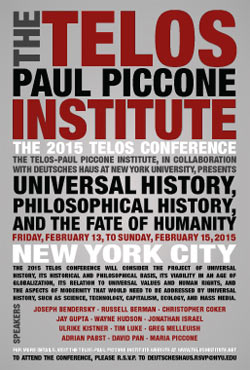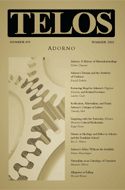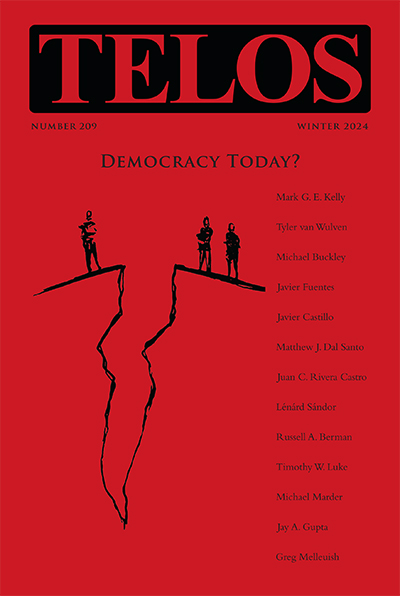By Telos Press · Monday, May 4, 2015
Beyond Nostalgia:
Ethics, Politics, and the Critique of Modernity
January 15–16, 2016
New York, NY
On January 15–16, 2016, the Telos-Paul Piccone Institute will hold its annual conference in New York City. The theme of the conference will be “Beyond Nostalgia: Ethics, Politics, and the Critique of Modernity.” If you wish to participate in the conference, please send an abstract (no more than 250 words) and short c.v. to telosnyc@telosinstitute.net by August 15, 2015, and place “The 2016 Telos Conference” in the email’s subject line.
Continue reading →
By Jay A. Gupta · Monday, March 30, 2015  Hegel’s lectures on the philosophy of history chart the development of free, reflective self-conscious selves, but what exactly does that mean? For skeptics, it doesn’t mean much, as Hegel notoriously appears to ground this development in the development of the state. This has inspired Popper’s well-known accusations that Hegel was a puppet of the Prussian monarchy, the “enemy of the open society,” etc., etc., and that the “free” subjects of the state as Hegel describes it are anything but. Further, from Marx to Habermas, Hegel is indicted as one who adopts a quietist attitude of priestly monasticism, so while those imbued with the proper critical, historical consciousness are busy trying to change the world according to the dictates of one or another praxis philosophy, Hegel is content to contemplate it as it goes up in flames. Habermas sees in Hegel’s mature work a “blunting of critique” and a “stoic retreat” from the problems of modernity, the very ones that Habermas believes the younger Hegel so incisively diagnosed. Hegel’s lectures on the philosophy of history chart the development of free, reflective self-conscious selves, but what exactly does that mean? For skeptics, it doesn’t mean much, as Hegel notoriously appears to ground this development in the development of the state. This has inspired Popper’s well-known accusations that Hegel was a puppet of the Prussian monarchy, the “enemy of the open society,” etc., etc., and that the “free” subjects of the state as Hegel describes it are anything but. Further, from Marx to Habermas, Hegel is indicted as one who adopts a quietist attitude of priestly monasticism, so while those imbued with the proper critical, historical consciousness are busy trying to change the world according to the dictates of one or another praxis philosophy, Hegel is content to contemplate it as it goes up in flames. Habermas sees in Hegel’s mature work a “blunting of critique” and a “stoic retreat” from the problems of modernity, the very ones that Habermas believes the younger Hegel so incisively diagnosed.
Continue reading →
By Telos Press · Friday, March 21, 2014 Telos Editorial Associate Jay Gupta recently spoke with C.S. Soong on Pacifica Radio’s Against the Grain, a show about politics, society, and ideas. Their conversation turned to ethics, objective vs. subjective truth, and the manner in which war is reported in the media. Listen the full interview at the Against the Grain website here.
Continue reading →
By Wes Tirey · Tuesday, June 19, 2012 The cover of the most recent issue of The Economist reads: “Morals and the machine: Teaching robots right from wrong.” A short piece in the magazine states: “As robots become more autonomous, the notion of computer-controlled machines facing ethical decisions is moving out of the realm of science fiction and into the real world. Society needs to find ways to ensure that they are better equipped to make moral judgments.” Moreover, as robots “become smarter and more widespread, autonomous machines are bound to end up making life-or-death decisions in unpredictable situations, thus assuming—or at least appearing to assume—moral agency.”
Continue reading →
By Fabian Freyenhagen · Tuesday, July 19, 2011 Fabian Freyenhagen’s “Adorno’s Ethics Without the Ineffable” appears in Telos 155 (Summer 2011). Read the full version online at the Telos Online website, or purchase a print copy of the issue in our store.
 There is a perennial problem affecting Adorno’s philosophy: his critical theory seems to lack the resources to account for the normative claims it contains. In an influential article, James Gordon Finlayson has analyzed this problem and offered an intriguing solution to it. According to Finlayson, Adorno subscribes to a normative ethics, but this commitment is in tension with his view that we cannot know the good or any positive values (in short, with his negativism). Finlayson argues that by drawing only on resources within Adorno’s philosophy, it is, however, possible to provide access to a kind of good that is suitable as a normative basis for his ethics (namely, the good involved in the experiences of trying to have insights into what is ineffable); and this is the best way to resolve the tension between Adorno’s normative commitment and his negativism. In this essay, I show that this proposal is unsuitable both (1) as a normative basis of Adorno’s ethics and (2) for explaining how it is possible for people to act according to this ethics. I outline an alternative solution that relies only on Adorno’s conception of the bad and defend it against objections. There is a perennial problem affecting Adorno’s philosophy: his critical theory seems to lack the resources to account for the normative claims it contains. In an influential article, James Gordon Finlayson has analyzed this problem and offered an intriguing solution to it. According to Finlayson, Adorno subscribes to a normative ethics, but this commitment is in tension with his view that we cannot know the good or any positive values (in short, with his negativism). Finlayson argues that by drawing only on resources within Adorno’s philosophy, it is, however, possible to provide access to a kind of good that is suitable as a normative basis for his ethics (namely, the good involved in the experiences of trying to have insights into what is ineffable); and this is the best way to resolve the tension between Adorno’s normative commitment and his negativism. In this essay, I show that this proposal is unsuitable both (1) as a normative basis of Adorno’s ethics and (2) for explaining how it is possible for people to act according to this ethics. I outline an alternative solution that relies only on Adorno’s conception of the bad and defend it against objections.
Continue reading →
|
|
 Hegel’s lectures on the philosophy of history chart the development of free, reflective self-conscious selves, but what exactly does that mean? For skeptics, it doesn’t mean much, as Hegel notoriously appears to ground this development in the development of the state. This has inspired Popper’s well-known accusations that Hegel was a puppet of the Prussian monarchy, the “enemy of the open society,” etc., etc., and that the “free” subjects of the state as Hegel describes it are anything but. Further, from Marx to Habermas, Hegel is indicted as one who adopts a quietist attitude of priestly monasticism, so while those imbued with the proper critical, historical consciousness are busy trying to change the world according to the dictates of one or another praxis philosophy, Hegel is content to contemplate it as it goes up in flames. Habermas sees in Hegel’s mature work a “blunting of critique” and a “stoic retreat” from the problems of modernity, the very ones that Habermas believes the younger Hegel so incisively diagnosed.
Hegel’s lectures on the philosophy of history chart the development of free, reflective self-conscious selves, but what exactly does that mean? For skeptics, it doesn’t mean much, as Hegel notoriously appears to ground this development in the development of the state. This has inspired Popper’s well-known accusations that Hegel was a puppet of the Prussian monarchy, the “enemy of the open society,” etc., etc., and that the “free” subjects of the state as Hegel describes it are anything but. Further, from Marx to Habermas, Hegel is indicted as one who adopts a quietist attitude of priestly monasticism, so while those imbued with the proper critical, historical consciousness are busy trying to change the world according to the dictates of one or another praxis philosophy, Hegel is content to contemplate it as it goes up in flames. Habermas sees in Hegel’s mature work a “blunting of critique” and a “stoic retreat” from the problems of modernity, the very ones that Habermas believes the younger Hegel so incisively diagnosed.  There is a perennial problem affecting Adorno’s philosophy: his critical theory seems to lack the resources to account for the normative claims it contains. In an influential article, James Gordon Finlayson has analyzed this problem and offered an intriguing solution to it. According to Finlayson, Adorno subscribes to a normative ethics, but this commitment is in tension with his view that we cannot know the good or any positive values (in short, with his negativism). Finlayson argues that by drawing only on resources within Adorno’s philosophy, it is, however, possible to provide access to a kind of good that is suitable as a normative basis for his ethics (namely, the good involved in the experiences of trying to have insights into what is ineffable); and this is the best way to resolve the tension between Adorno’s normative commitment and his negativism. In this essay, I show that this proposal is unsuitable both (1) as a normative basis of Adorno’s ethics and (2) for explaining how it is possible for people to act according to this ethics. I outline an alternative solution that relies only on Adorno’s conception of the bad and defend it against objections.
There is a perennial problem affecting Adorno’s philosophy: his critical theory seems to lack the resources to account for the normative claims it contains. In an influential article, James Gordon Finlayson has analyzed this problem and offered an intriguing solution to it. According to Finlayson, Adorno subscribes to a normative ethics, but this commitment is in tension with his view that we cannot know the good or any positive values (in short, with his negativism). Finlayson argues that by drawing only on resources within Adorno’s philosophy, it is, however, possible to provide access to a kind of good that is suitable as a normative basis for his ethics (namely, the good involved in the experiences of trying to have insights into what is ineffable); and this is the best way to resolve the tension between Adorno’s normative commitment and his negativism. In this essay, I show that this proposal is unsuitable both (1) as a normative basis of Adorno’s ethics and (2) for explaining how it is possible for people to act according to this ethics. I outline an alternative solution that relies only on Adorno’s conception of the bad and defend it against objections. 

